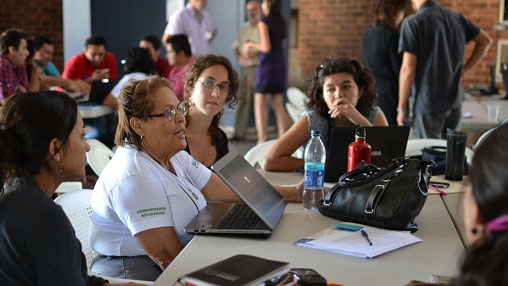Digital Solutions
Over one marathon weekend, over 350 ‘hackers’ worked non-stop to “address the challenge of domestic violence by building technology solutions to assist agencies that work to support victims and advance efforts to bring perpetrators to justice.” And at the end of the two days, prototype apps ranged from SMS-based alert services and web-based programmes, to one winning team even using Facebook to target at-risk teenagers.
One such participant is Javier Ogarrio, who sees the hackathon as a chance to combine his day-to-day job as a developer with his passion to see his native Guatemala develop.
‘In Guatemala, violence is a significant problem. Being able to get involved with something which combines my passion and my day to day life and do something for the country which can really have a positive effect is something I find very motivating,” Javier explains.
A selection of the winning prototypes:
- A web app to combat cyber stalking, in Washington. The winning proposal not only alerted victims to the presence of a tracker, but also provided them with information on cleaning the device
- A web and SMS-based app, to alert trusted friends and family in case of teenage girls being taken abroad for a forced marriage, which has affected over 3,000 girls in the US over the past 2 years.
- Prevention was the focus of the winning team in El Salvador, who built a SMS and web-integrated hotline, providing information on gender-related violence and how to report an incident.
- In Costa Rica, teenagers were the focus of the winning app. Using the popular Faceboook quiz, an app was developed questioning teenagers on how healthy their relationship really is. Results could then be shared on the social networking site.
- In a country with more phones than people, most of the 8 prototypes built in Guatemala used SMS functionality to help victims with finding jobs and independence, making a complaint and even provide a step-by-step guide for victims of domestic abuse.
- The winning team, however, built on the anonymity of social-networking sites, building an anonymous cyberspace for victims to learn from and share their experiences.
What is the Bank doing?
A key development challenge, domestic violence has far-reaching consequences, posing a health, legal, economic, education, developmental, social and human rights problem for the region. Given the complexity of the issue, projects touching upon domestic violence are spread across the gamut of the World Bank’s outreach programs.
In Latin America these include:
- Raising the issue of gender violence in public sector and judiciary reforms in Ecuador, Colombia, Honduras and Perú.
- Preventing gender violence in Bank projects by training health staff to identify signs of abuse and setting out guidelines for preventing violence within schools.
- Participants of a social protection project in Honduras receiving counseling to help deal with the effects of domestic violence.
- The signing of an agreement with Brazil’s House of Representatives to strengthen the capabilities of their Special Office for Women’s Affairs.
- Joining forces with partner organizations in Haiti to identify, counsel and support victims of gender violence.
Local organizations were involved with the hackathon in each country, providing information and support to the hackers as well as helping to ensure that the proposals are then implemented. In Washington, hackers were joined by: House of Ruth, Mary's Center, the American Bar Association, Microsoft, and The Web Development Group.

